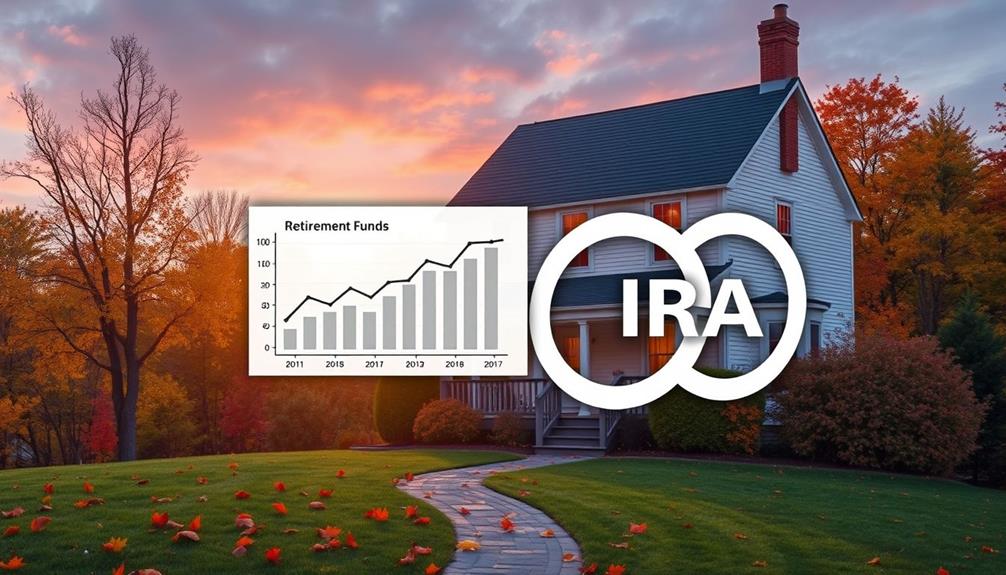When preparing for retirement in Massachusetts, it is crucial to consider how your IRAs can work alongside the specific benefits offered by the state. Although Massachusetts does not provide a state tax deduction for IRA contributions, your earnings have the potential to grow tax-deferred. Additionally, pension distributions from state and local plans are typically not included in your taxable income. By combining contributions to pensions and IRAs, you can maximize your deductions and strengthen your retirement savings plan. It is also important to adhere to state regulations to prevent any penalties. Learn how these components can synergize to safeguard your financial future and explore any additional options available to you.
Key Takeaways
- Massachusetts offers unique tax benefits for public safety officers, allowing pension distributions to be excluded from state and federal gross income.
- Traditional IRA contributions are taxed at the state level, but distributions are not taxed by Massachusetts, maximizing tax efficiency.
- The Massachusetts CORE Plan enables tax-deferred contributions for eligible employees, enhancing retirement savings without immediate tax liabilities.
- Combining IRA and pension strategies is crucial for optimizing retirement savings and managing tax implications effectively.
- Compliance with state regulations regarding retirement plans is essential to avoid penalties and ensure employee participation in retirement savings programs.
Massachusetts IRA investment options
As an affiliate, we earn on qualifying purchases.
As an affiliate, we earn on qualifying purchases.
Overview of Retirement Planning

Retirement planning in Massachusetts is vital for ensuring financial stability during your golden years. Understanding the various state-specific benefits available to you can greatly enhance your financial planning.
For retirees, managing income through pensions is essential. Massachusetts offers tax exemptions on pension distributions from state and local government plans, making these options particularly advantageous.
When considering your contributions, be aware that you can take a maximum deduction of $2,000 for contributions made to state and local employee pensions. This provides valuable tax benefits that can support your retirement strategy.
While IRA contributions in Massachusetts previously lacked a deduction at the time of contribution, the earnings grow tax-free until withdrawal, making them a solid long-term investment.
If you're working in the non-profit or educational sectors, 403(b) plans also offer similar tax advantages to IRAs, allowing contributions to be excluded from your gross income. By integrating these retirement savings options, you can create a thorough financial plan tailored to your needs as a retiree.
Don't overlook the unique tax treatments available for public safety officers and other employees, which can further enhance your retirement income.

Don't Push Me
As an affiliate, we earn on qualifying purchases.
As an affiliate, we earn on qualifying purchases.
Understanding IRAs in Massachusetts

When planning for your financial future, understanding the intricacies of IRAs in Massachusetts can play a significant role in your strategy. Unlike many states, Massachusetts doesn't allow you to deduct IRA contributions from your state income tax, meaning you'll pay state taxes on those contributions upfront.
However, you can still benefit from tax-deferred growth on your earnings until you decide to withdraw funds. Additionally, exploring options like precious metal investments can further diversify your retirement portfolio.
In 2024, the contribution limits for IRAs are $7,000 for those under 50, and $8,000 for those aged 50 and older, which allows you to catch up on your retirement savings. One of the most appealing aspects of Massachusetts IRAs is that while distributions are included in federal gross income, the state doesn't tax distributions from traditional IRAs. This offers a tax-free advantage upon withdrawal, making it an attractive option for retirement planning.
Despite the lack of state-level tax deductions on contributions, the potential for tax-free earnings and favorable distribution treatment encourages residents to prioritize their retirement savings through IRAs.
retirement savings calculator Massachusetts
As an affiliate, we earn on qualifying purchases.
As an affiliate, we earn on qualifying purchases.
State-Specific Retirement Benefits

In Massachusetts, understanding state-specific retirement benefits can greatly enhance your financial planning. One noteworthy aspect is the Massachusetts CORE Plan, a defined contribution plan enabling eligible employees to make contributions on a tax-deferred basis. This adds valuable retirement savings options alongside Individual Retirement Accounts (IRAs).
While contributions to IRAs aren't tax-deductible, Massachusetts offers tax-free earnings. This means you can grow your retirement funds without immediate tax implications, although your contributions are still taxed up front. As of 2024, annual contribution limits are $6,500 for individuals under 50 and $7,500 for those aged 50 and above.
It's also essential to reflect on the tax treatment of pension plans. Certain pension distributions, especially those from state and local employee pension plans and public safety pensions, are excluded from Massachusetts gross income.
Additionally, you can claim a maximum deduction of $2,000 for contributions to these plans, which can greatly impact your overall retirement planning strategy. By leveraging these state-specific benefits, you can optimize your retirement savings and guarantee a more secure financial future.
Massachusetts pension benefit guide
As an affiliate, we earn on qualifying purchases.
As an affiliate, we earn on qualifying purchases.
Integration of IRAs and Pensions

When planning for retirement in Massachusetts, you need to understand how IRA contributions and pension distributions affect your tax situation.
Gold IRAs can be a valuable addition to your retirement strategy, providing a hedge against inflation and diversifying your portfolio.
While IRA contributions are taxed at the state level without deductions, pension distributions, particularly from state and local plans, can be excluded from your Massachusetts gross income.
Managing these tax implications helps you maximize your retirement savings effectively, especially when considering the benefits of Gold IRAs.
IRA Contribution Tax Implications
Understanding the tax implications of IRA contributions in Massachusetts is vital for effective retirement planning. When you make IRA contributions, you won't receive a tax deduction at the time of contribution. For 2023, the contribution limits are $6,500, or $7,500 if you're 50 or older.
While your earnings grow tax-free within the account, remember that any distributions you take will be fully taxable as income in Massachusetts. This means they'll impact your taxable income when reported on your state tax returns.
It's important to distinguish between IRA distributions and employee pensions. Unlike pension distributions from public safety and state/local employee pensions, which are excluded from Massachusetts gross income, IRA distributions are included in both your federal and state gross income. This can affect your overall tax liability considerably.
While the maximum deduction for contributions to state and local employee pensions is capped at $2,000, this rule doesn't apply to IRA contributions.
Understanding these tax implications will help you better navigate your retirement savings strategy and optimize your financial future in Massachusetts.
Pension Distribution Exclusions Explained
Pension distributions in Massachusetts offer unique tax advantages that can greatly influence your retirement strategy. Understanding these exclusions can help you optimize your tax planning. Here are key points to take into account:
- Public safety pensions, like those from police and fire departments, are excluded from both state and federal gross income.
- State and local employee pensions are excluded from Massachusetts gross income, yet included in federal gross income, providing potential state-level savings.
- Government pension income must be reported on MA Form 1, with potential exclusions available through Schedule Y based on other states' tax treatments.
When it comes to integrating your IRA contributions with pension distributions, it's essential to recognize that Massachusetts previously taxed IRA contributions without deductions.
This means your tax strategy might need adjustments to align with both pension income and IRA distributions effectively.
Navigating these nuances can lead to a more favorable financial outcome in retirement. By leveraging the exclusions available for your pension distributions, you can minimize your state gross income, ultimately enhancing your financial well-being during your golden years.
Tax Implications for Retirement Funds

In Massachusetts, steering through the tax implications for retirement funds can be complicated. Unlike many states, contributions to IRAs in Massachusetts are taxed at the time of contribution, which can affect your overall tax liabilities.
When you take distributions from a traditional IRA, these amounts are included in your federal gross income and also subject to Massachusetts state income tax, potentially impacting your retirement withdrawals.
While the earnings on your IRA investments grow tax-deferred until you withdraw them, you won't benefit from any state exemptions for IRA distributions, leading to higher tax liabilities in retirement.
Massachusetts does allow a deduction of up to $2,000 for contributions to state and local employee pensions, but this doesn't apply to traditional IRAs.
This unique tax structure means that as you plan your retirement savings, you'll want to carefully consider how the treatment of IRAs and pensions will play into your long-term financial picture.
Understanding these tax implications will help you make informed decisions and better prepare for your financial future in Massachusetts.
Employer-Sponsored Retirement Plans

Employer-sponsored retirement plans play an essential role in helping you build a secure financial future. In Massachusetts, these plans offer various options tailored to meet different business sizes and employee needs.
By participating in employer-sponsored retirement plans, you can take advantage of valuable tax benefits that enhance your overall compensation package.
Consider the benefits of these plans:
- Tax deductions for contributions made to employee retirement accounts.
- Reduced administrative burdens through programs like the Massachusetts Defined Contribution CORE Plan, which is managed by the Commonwealth.
- SECURE Act tax credits for small businesses starting a 401(k) plan, offsetting startup costs.
You can choose from several options, including 401(k) plans, SIMPLE IRAs, and state-sponsored plans. Each of these options allows for employee contributions, creating a robust retirement savings program.
For small businesses, the CORE Plan has seen over 110 nonprofits adopt it, covering more than 700 employees. This not only simplifies management but also provides a tax-deferred retirement savings option.
Compliance With State Regulations

When planning for retirement in Massachusetts, you need to understand the state's specific requirements and deadlines for compliance.
Missing these regulations can lead to costly penalties, so it's essential to stay informed about what's expected.
Let's break down the key points you should know to guarantee you're on track.
Understanding State Requirements
Steering through the maze of state regulations for retirement planning in Massachusetts can feel overwhelming, but understanding your obligations is vital.
As an employer, you need to know that if you have five or more employees, you must comply with state-sponsored retirement plans. Here are a few key points to keep in mind:
- Non-compliance can lead to penalties ranging from $20 to $500 per employee.
- Contributions to traditional IRAs aren't tax-deductible at the state level, while Roth IRA contributions are made with after-tax dollars.
- Pension income must be reported on MA Form 1 for residents and MA Form 1-NR/PY for part-year residents.
Participating in Massachusetts' CORE Plan can help you manage your employee retirement offerings while reducing administrative burdens.
This plan allows for tax-deferred contributions, making it an attractive option. Staying informed about compliance with these state-specific regulations not only helps you avoid penalties but also guarantees you're meeting your tax obligations effectively.
Don't underestimate the importance of understanding these requirements; they play a vital role in your retirement planning strategy in Massachusetts.
Registration Deadlines Explained
Understanding the registration deadlines for state-mandated retirement plans is vital for your business's compliance in Massachusetts. Employers must register by specific deadlines, which vary based on the size of your business and local regulations.
For instance, if you have five or more employees, you need to register for retirement plans like the auto-IRA program. Staying informed about these registration deadlines is key to avoiding penalties.
In Massachusetts, failing to comply with these deadlines can result in significant penalties. Depending on the specifics of your situation, you could face fines ranging from $20 to $500 per employee.
It's important to regularly check for updates regarding these deadlines, as regulations can evolve over time. This will guarantee that your business remains compliant with state requirements and adequately supports your employees' retirement savings through IRAs and other programs.
Penalties for Non-Compliance
Non-compliance with Massachusetts state-mandated retirement plans can lead to serious financial repercussions for employers. If you fail to register or adhere to regulations, you could face escalating penalties that impact your bottom line.
Here are some key consequences to take into account:
- Fines range from $20 to $500 per employee: The amount depends on the duration of non-compliance and the size of your workforce.
- Potential annual increases: For larger employers, fines can skyrocket to as much as $5,000 if you continuously ignore retirement plan mandates.
- Automatic payroll implementation: Not utilizing automatic payroll systems for state-sponsored plans can also result in hefty penalties.
To avoid these penalties, make certain you're registered for state-sponsored retirement plans if you have five or more employees, and stay updated on changing regulations.
Ignoring your obligations can lead to costly fines, and it's crucial to integrate compliance into your business strategy.
Remember, being proactive about registration and understanding the requirements will save you money and safeguard your employees' financial futures.
Don't wait until it's too late—act now to keep your business compliant!
Special Considerations for Public Employees

Public employees in Massachusetts enjoy unique retirement benefits that can considerably enhance their financial well-being. One key advantage lies in public safety pensions; these are excluded from both federal and state gross income, providing you with substantial tax benefits during retirement. Additionally, contributions to state and local employee pensions are included in Massachusetts gross income but are exempt from federal income, making your retirement planning even more favorable.
Here's a quick overview of how different retirement benefits are treated:
| Benefit Type | Tax Treatment |
|---|---|
| Public Safety Pensions | Excluded from federal and state income |
| Employee Contributions | Included in state gross income |
| Survivor Annuities | Excluded from federal and state income |
| Federal Employee Pensions | Included in both federal and state income |
The Massachusetts MBTA pension plan also offers exclusions for employee contributions and income earned, further enhancing your benefits. With these considerations in mind, you can make informed decisions about your IRAs and other retirement savings. Understanding these nuances can greatly improve your financial security in retirement.
Strategies for Maximizing Savings

Maximizing your retirement savings in Massachusetts requires a strategic approach that leverages available tax benefits and account options. By understanding how to effectively use different retirement plans, you can greatly boost your savings.
Consider these strategies:
- Combine contributions: Take advantage of the maximum deduction of $2,000 for contributions to state and local employee pensions alongside your IRA contributions.
- Utilize tax-sheltered accounts: Participate in plans like a 403(b) TSA or TIAA-CREF, which allow contributions to be excluded from gross income, enhancing your tax advantages.
- Make catch-up contributions: If you're 50 or older, use the additional $1,000 catch-up contributions for IRAs to increase your retirement savings potential.
Integrating state-mandated retirement plans, such as the CORE Plan, with your personal IRAs creates a diversified savings strategy.
This approach maximizes your contributions and capitalizes on tax advantages across various accounts.
Remember, while IRA contributions in Massachusetts don't receive a state tax deduction, their tax-free growth can lead to a more substantial accumulation over time.
Resources for Retirement Planning

When you're steering through retirement planning in Massachusetts, having access to the right resources can make all the difference in achieving your goals. Understanding how to integrate your IRAs with state-specific retirement benefits is essential. The Massachusetts Department of Revenue offers valuable guidance on maneuvering through the tax implications of your contributions.
For 2024, you can contribute up to $7,000 to your IRA, or $8,000 if you're 50 or older, allowing you to take advantage of tax-free earnings on these contributions.
Additionally, it's vital to acknowledge that while contributions to state and local employee pension plans count towards your Massachusetts gross income, they're excluded from federal gross income, providing unique tax advantages.
If you're a retiree with public safety pensions from police or fire departments, you'll benefit from full exclusion from both Massachusetts and federal gross income, which can greatly enhance your retirement benefits.
Utilizing these resources effectively will help you maximize your retirement planning strategy, ensuring you're well-prepared for the future while making the most of your financial situation in Massachusetts.
Frequently Asked Questions
What Is the Massachusetts State Retirement Plan?
The Massachusetts State Retirement Plan focuses on public employee pensions, offering tax-deferred contributions. You'll benefit from options like the CORE Plan and auto-IRA programs, ensuring a secure financial future as you prepare for retirement.
Does Massachusetts Have State Income Tax on Retirement Income?
Yes, Massachusetts does impose state income tax on retirement income, including distributions from employer-funded plans like 401(k)s. However, certain pensions, especially public safety ones, are exempt from state taxation, benefiting those retirees considerably.
Can You Collect Social Security and a State Pension in Massachusetts?
Yes, you can collect both Social Security and a state pension in Massachusetts. The state doesn't reduce your Social Security benefits, allowing you to maximize your income from these sources without penalties.
What Is the Double Dipping Law in Massachusetts?
The Double Dipping Law in Massachusetts prevents you from receiving both a pension and salary from the same public employer simultaneously. If you retire and return, your pension benefits might be suspended until you stop working.
Conclusion
In summary, steering through retirement planning in Massachusetts requires a keen understanding of IRAs and state-specific benefits. By integrating these elements and considering the tax implications, you can enhance your financial security. Don't forget to account for compliance with state regulations and special provisions for public employees. As you strategize to maximize your savings, remember, the road to a comfortable retirement is paved with informed decisions—much like a well-executed ballet, where every move counts.









